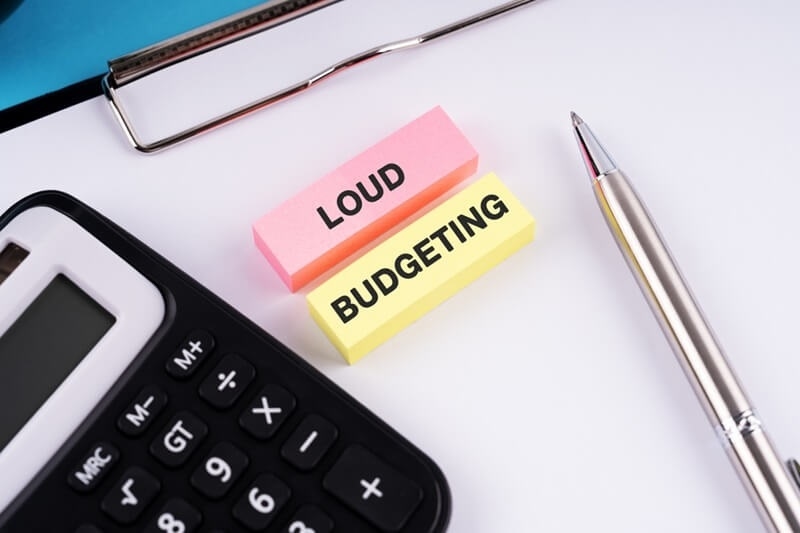
If you’ve been hearing the term “loud budgeting” lately and wondering what loud budgeting is all about, you’re not alone. The concept blew up thanks to social media, but at its core, the loud budgeting meaning is simple: you talk openly about your money choices instead of quietly stressing about them.
So, what is loud budgeting in real life? It’s saying out loud, “I can’t go out for dinner this week because I’m saving for my trip,” or “I’m cutting back on streaming subscriptions so I can build my emergency fund.” Instead of hiding behind excuses, you’re transparent about your financial priorities. And surprisingly, this kind of honesty not only saves money but also takes the pressure off trying to keep up with others.
Loud budgeting isn’t about being cheap—it’s about being intentional. When you’re upfront, you create accountability. Friends know your goals, you remind yourself why you’re saying no, and you avoid guilt spending.
The best part? Loud budgeting reframes the conversation. Instead of “I can’t afford it,” it becomes “I don’t want to spend on that right now.” That small shift changes how you feel about money. It’s not about restriction; it’s about control.
And if tried-and-true money-saving techniques apply to your life, then singing the praises of loud budgeting followed by a simple method like the 50/30/20 rule or zero-based budgeting will certainly help. Loud budgeting sets the tone, while structure ensures your finances actually stay on track.
Dive in deeper: Smarter Spending Starts Here: Master the 50/30/20 Rule

Here are some common-sense ideas into how you can work loud budgeting into your life:
Don't let that budget be hidden in an app you never bother to open. Write it on a whiteboard, paste it up on your fridge, or make it the wallpaper for your phone. The louder and clearer your goals look, the harder they are to ignore.
Want to save $5,000 this year? Say it. Share it with your family, friends, or even post it online if you’re comfortable. Loud budgeting works because you’re not keeping your money plans a secret. When people know what you’re aiming for, they’ll respect your choices—or even join you.
Skipped that $8 latte three times this week? That’s almost $25 saved. Don’t brush it off. Celebrate it. Loud budgeting thrives on momentum. Small wins keep you going, and acknowledging them reminds you why you started.
When friends invite you to something pricey, you don’t have to disappear. Offer an ordinary kind of solution: "Well, I'm on a budget, but how about we do some cooking together?" Loud budgeting is not always about a No—it is about another plan through which you can spend some time doing fun things reasonably.
Budgeting out loud is great by itself, but when combined with tried-and-true systems, it's even more effective:
These methods of saving work hand in hand with sound budgeting by ensuring the deeds are congruent with the words.
Must Read: Build an Emergency Fund Without Sacrificing Comfort
To really grasp the loud-budgeting meaning, imagine:
This is what loud budgeting really looks like day-to-day: honest, unapologetic, and freeing.
For some, the term loud budgeting seems to imply oversharing about personal details or bragging about being frugal. That isn't it. Loud budgeting is not about telling the world your exact bank balance. It’s about owning your money choices without shame.
Another misconception is that loud budgeting is only for broke people. Not true. High earners make use of it to maintain their focus on big goals—like coming out of debt faster, saving for a down payment, or retiring early.
So when you wonder, what's loud budgeting really about? Remember: it is not about lacking but about priorities.
Just like any other habit, loud budgeting should be best made to feel natural. Here's how to keep it up:
These simple habits keep loud budgeting from being just another short-lived money trend.
We live in a world where spending is easy, and social media makes it harder to resist. Loud budgeting flips the script: Instead of flexing purchases, people are flexing savings goals. And honestly, that's a breath of fresh air.
The rise of loud budgeting also signifies the people's frustration with money remaining a taboo. Making money talk too less scary and more doable. It encourages better money saving methods and healthier money habits overall.
Don’t Miss: Tips to Start Saving Money Even When You Think You Can't
So, what is loud budgeting in the end? It’s a money strategy that’s less about crunching numbers and more about owning your choices. The loud budgeting meaning is simply being transparent: you say it out loud, you set boundaries, and you make your money work for you instead of the other way around.
For everyday people, loud budgeting is more than just a trend—it’s a practical tool. It lets you save money, reduce stress, and still live your life without feeling deprived. Pair it with tried-and-true money-saving methods, and you’ve got a system that actually sticks.
Next time someone asks you out to something expensive, try it: be loud, be honest, and remember—your goals are worth it.
This content was created by AI